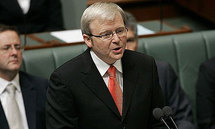Pain haunts Australia's 'forgotten' children decades on
Madeleine Coorey
SYDNEY, Madeleine Coorey - By the time she was seven, Caroline Carroll had known all kinds of abuse. The couple she thought were her parents had tried to drown her in the bath, had physically hurt her, had neglected her.
"I was abused in every way you can imagine," Carroll, now a grandmother, says quietly. "She was very violent and they were both alcoholics, the foster parents. It was a pretty awful life."

But she knows her story is not unique among the so-called "Forgotten Australians", the 500,000 minors placed in orphanages, foster homes and institutional care between the 1930s and 1970s.
"It is not unique unfortunately," she says. "Not everyone was abused and we recognise that and we applaud the people who did their very best in these cases. But for the rest of us, the abuse was just horrendous."
Prime Minister Kevin Rudd will acknowledge this when he makes a formal apology on Monday to those placed in care, including the estimated 7,000 sent from Britain as child migrants between 1920 and 1967.
His words are designed to make amends for the past experiences of children who suffered the loss of family and identity and, in the case of child migrants, loss of country.
It follows Rudd's historic apology last year to Aborigines for the abuse and discrimination suffered in the two centuries since European settlement -- a move hailed as a breakthrough in indigenous relations.
The plight of those Australians raised in care has strong parallels with the indigenous "Stolen Generation" -- those of Aboriginal blood taken from their families in the belief they could be better reared by whites.
Many never knew their parents or siblings, or even their own names, which could change each time they moved accommodation. Sometimes they were referred to simply by a number.
A Senate inquiry unearthed hundreds of disturbing stories of children placed in care due to family breakdown, because their mothers were unmarried, or because they were considered uncontrollable, neglected or in moral danger.
It found that abuse and assault were widespread; that neglect, humiliation and the deprivation of food, education and medical care occurred, and that emotional, physical and sexual abuse were often experienced.
For the child migrants, many were not told the truth about what happened to their parents, and their parents were lied to as well.
"But the overwhelming response as to treatment in care, even among those that made positive comments, was the lack of love, affection and nurturing that was never provided to young children at critical times during their emotional development," the 2004 inquiry found.
It said the legacy of these childhood experiences had left many people emotionally scarred, with many resorting to drug and alcohol abuse and an "abnormally large" percentage committing suicide.
Minister for Families Jenny Macklin sees the apology as a way the nation can collectively acknowledge the appalling way many people were treated, describing the levels of abuse as "beyond most people's imagination."
"Many were put to terrible menial work and not allowed to get a decent education, as well as suffering terrible levels of abuse," she said last week.
"We certainly do hope that it will heal, that it will help people who have been treated so badly.
"But I do think it is important too, for us all to acknowledge what did happen in the past and that we bring it out into the open."
Carroll, who chairs the support group the Alliance for Forgotten Australians, said many of those who grew up in care are still dealing with the impact.
Many are still in prisons and mental health hospitals, while others suffer depression and feelings of worthlessness. Just days before the apology, a man who had campaigned all his life for forgotten Australians committed suicide, she said.
"You have that insecurity and lack of self-esteem and all of that with you forever," she says. "That feeling of never being good enough doesn't go away."
------------------------------------------------------------------------------------------------------------------------------------